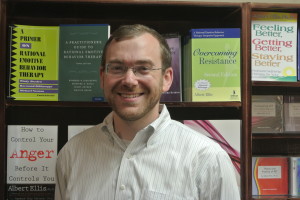By Mark Schiffman, M.S.
A Harris poll conducted last week on behalf of the Webby awards reported that while most millennials constantly check their phones, more than half of the respondents said that they think they would be happier if they used their phones less.[1] While I wasn’t polled personally, I would agree with that sentiment.
REBT is not just interested in alleviating emotional and behavioral distress caused by irrational beliefs, but it is also concerned with the pursuit of happiness. It is for this reason that Martin Seligman, the founder of the new field of Positive Psychology, referred to Albert Ellis as “an unsung hero of Positive Psychology.”[2]
One particular area where this idea is evident is in the concept coined by Mihaly Csikszentmihalyi as flow. Flow is described by Csikszentmihalyi as an optimal experience with a number of components, including: 1) a task that is challenging, but we have the tools to succeed, 2) there are clear goals, 3) there is immediate feedback, 4) there is deep concentration, 5) our sense of self disappears, and 6) time slows down.[3] The concept of flow is similar to what Ellis called a vitally absorbing pursuit or activity. He identified three forms of vital absorption: 1) being absorbed in other people, 2) being absorbed in a thing or object, and 3) being absorbed in an idea.2 Ellis argued that having activities that one can become vitally absorbed in can be a big contributor to personal happiness, and the empirical literature on flow has demonstrated this well.
It is very difficult to experience flow or to be vitally absorbed with other people, things, or ideas when we have a smartphone to constantly distract us. I often feel that even when I am not actually using my phone, it is still distracting me. Even the anticipation of checking my email or social media makes it more difficult to give my undivided attention to the person/thing/idea in front of me. If we want more lasting happiness and fulfillment, we would do well to turn off our phones every once in a while and pursue a vitally absorbing activity without any distraction.
[1] http://www.cbsnews.com/news/millennials-admit-smartphones-are-sapping-their-happiness/
[2] Michael E. Bernard , Jeffrey J. Froh , Raymond DiGiuseppe , Marie R. Joyce & Windy Dryden (2010)
Albert Ellis: Unsung hero of positive psychology, The Journal of Positive Psychology: Dedicated to furthering research and promoting good practice, 5:4, 302-310, DOI: 10.1080/17439760.2010.498622
[3] Csikszentmihalyi, M. (1990). Flow: The psychology of optimal experience (p. 71). New York: Harper & Row.

